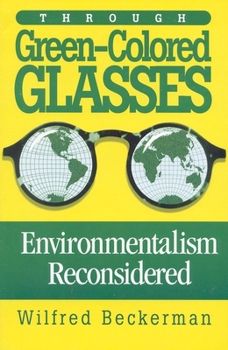Through Green-Colored Glasses: Enviromentalism Reconsidered
Select Format
Select Condition 
Book Overview
A former member of the Royal Commission on Environmental Pollution reveals the flaws in alarmist environmental movement arguments.
Format:Paperback
Language:English
ISBN:1882577361
ISBN13:9781882577361
Release Date:September 1996
Publisher:Cato Institute
Length:230 Pages
Weight:3.00 lbs.
Dimensions:0.6" x 6.0" x 9.0"
Customer Reviews
1 rating
We should not be taken for a ride by the environmentalists
Published by Thriftbooks.com User , 26 years ago
Through Green-Colored Glasses: Environmentalism ReconsideredWilfred Beckerman "We should not be taken for a ride by the environmentalist movement's predictions that we are one the verge of environmental catastrophe," writes Wilfred Beckerman in the Cato Institute book, Through Green-Colored Glasses: Environmentalism Reconsidered. Beckerman, an Emeritus Fellow of Balliol College, Oxford, and a former member of the Royal Commission on Environmental Pollution, has written this volume as a sequel to his widely acclaimed In Defense of Economic Growth, which originally appeared in 1974. Like its predecessor, Through Green-Colored Glasses, which was published in England last year under the title Small Is Stupid: Blowing the Whistle on the Greens, has garnered significant praise. The Economist stated that its "arguments are piercing" and Nature remarked, "Environmentalists tempted to ignore Wilfred Beckerman's latest book better think again. . . . Beckerman has written a thoughtful book as well as an entertaining one."He explodes a number of myths currently advanced by radical environmentalists, including the assertion that natural resource depletion is imminent and the never-ending claims regarding global warming. He contrasts those supposed "threats" to the environment with the very real ecological problems that face Third World countries and concludes that economic growth is the only way those areas will be able to develop the technology and wealth needed to handle their problems. In addition, he insightfully discusses the question of what society owes future generations. Beckerman believes the argument regarding natural resource depletion is "flawed in every respect." It is "at variance with the whole of historical experience, and it takes no account of the way that societies adapt to change in the demands and supplies of materials." Defending his position, he cites numerous examples of how the market has dealt with temporary resource shortages, such as the development of synthetic rubber during World War II and the creation of plastic as a replacement for various metals.While acknowledging that global warming "has to be taken seriously," Beckerman maintains that it is "no cause for alarm or dramatic action." If dramatic action were taken, the effects on human welfare would be horrendous--even more horrendous perhaps than the effects of global warming itself. "With the global-warming problem," Beckerman writes, "society is faced with the choice between (i) accepting some remote and unquantifiable possibility of sharp climatic change in the longer run with possibly severe economic effects and (ii) certain economic and social catastrophe if draconian policies are adopted to avoid it." The ecological problems of the Third World, Beckerm





